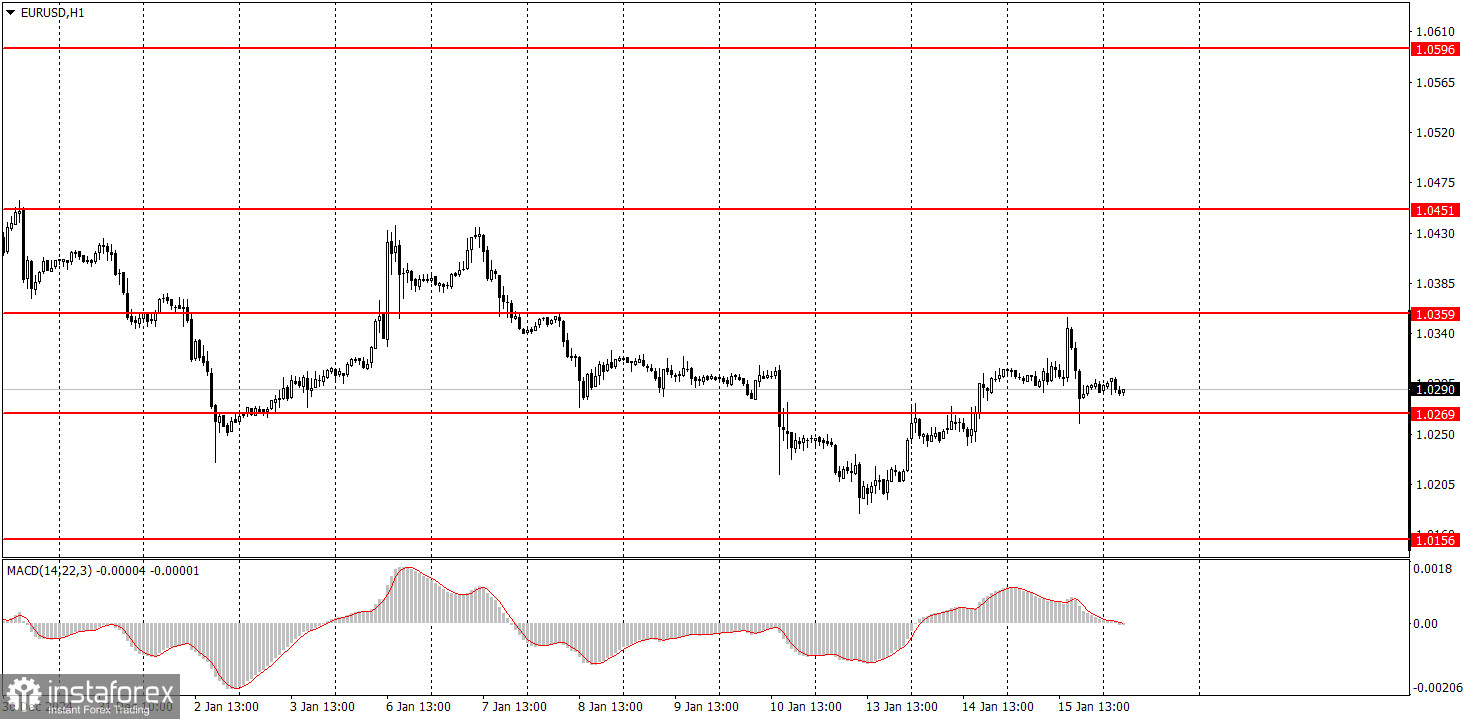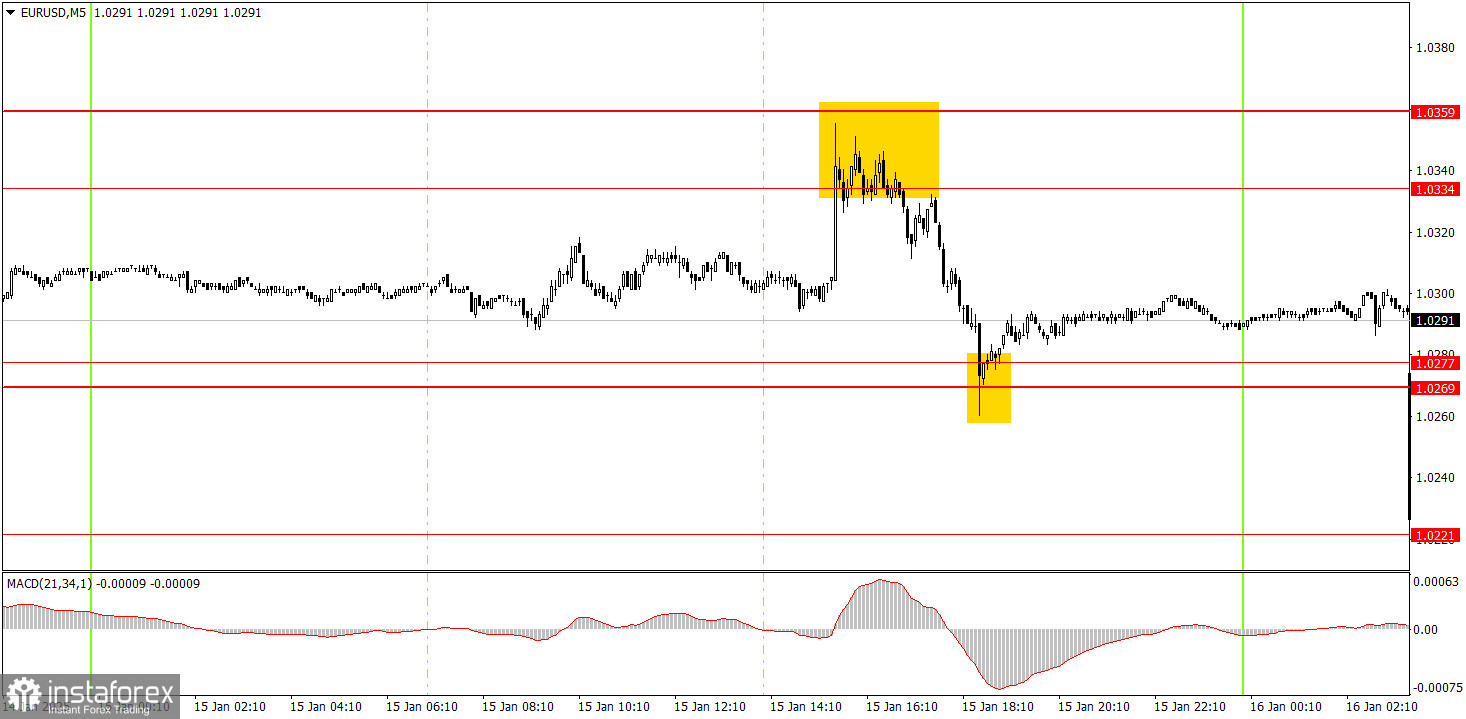Analysis of Wednesday's Trades
1H Chart of EUR/USD

The EUR/USD pair exhibited significant volatility on Wednesday. Initially, the price remained stagnant as traders awaited the release of the US inflation report. Following the report, there was a sharp rise in the exchange rate, despite the inflation data not being decisively negative for the dollar. However, within an hour, the euro dropped steeply again. This recent movement suggests that the market has undergone another corrective phase, which may have concluded yesterday.
It is important to note that a downtrend has persisted for the past three and a half months, and a broader downtrend has been in effect for the last 16 years. Therefore, it is reasonable to expect further declines in the pair. Regarding the inflation report, while interpretations may differ, we believe the key takeaway is that the Consumer Price Index has risen for the third consecutive month. This trend raises doubts about the anticipated two rate cuts by the Federal Reserve in 2025, thereby reinforcing the dollar's growth potential.
5M Chart of EUR/USD

On the 5-minute timeframe, two clear trading signals emerged on Wednesday. Initially, the pair rebounded from the 1.0334–1.0359 range and then dropped to the 1.0269–1.0277 range. In both instances, a rebound occurred, creating a trading signal. Novice traders could have first opened a short position and subsequently a long one, with both trades resulting in profits. In fact, the long position could even be carried over into Thursday.
Trading Strategy for Thursday:
On the hourly timeframe, the EUR/USD pair remains in a downtrend. We believe the decline of the euro has resumed in the medium term, with little distance left to reach parity. As observed previously, the euro is likely to fall further, supported by fundamental and macroeconomic factors that favor the US dollar.
Movements in the pair on Thursday may be relatively muted due to a weak macroeconomic backdrop, meaning that technical signals will play a more significant role in trading decisions.
On the 5-minute timeframe, we should consider the following levels: 1.0156, 1.0221, 1.0269–1.0277, 1.0334–1.0359, 1.0433–1.0451, 1.0526, 1.0596, 1.0678, 1.0726–1.0733, 1.0797–1.0804, and 1.0845–1.0851. In the Eurozone, only the second estimate of December inflation in Germany will be released on Thursday, and no surprises are expected. In the US, the most critical report will be on retail sales, but it is unlikely to trigger a significant market reaction.
Core Trading System Rules:
- Signal Strength: The shorter the time it takes for a signal to form (a rebound or breakout), the stronger the signal.
- False Signals: If two or more trades near a level result in false signals, subsequent signals from that level should be ignored.
- Flat Markets: In flat conditions, pairs may generate many false signals or none at all. It's better to stop trading at the first signs of a flat market.
- Trading Hours: Open trades between the start of the European session and the middle of the US session, then manually close all trades.
- MACD Signals: On the hourly timeframe, trade MACD signals only during periods of good volatility and a clear trend confirmed by trendlines or trend channels.
- Close Levels: If two levels are too close (5–20 pips apart), treat them as a support or resistance zone.
- Stop Loss: Set a Stop Loss to breakeven after the price moves 15 pips in the desired direction.
Key Chart Elements:
Support and Resistance Levels: These are target levels for opening or closing positions and can also serve as points for placing Take Profit orders.
Red Lines: Channels or trendlines indicating the current trend and the preferred direction for trading.
MACD Indicator (14,22,3): A histogram and signal line used as a supplementary source of trading signals.
Important Events and Reports: Found in the economic calendar, these can heavily influence price movements. Exercise caution or exit the market during their release to avoid sharp reversals.
Forex trading beginners should remember that not every trade will be profitable. Developing a clear strategy and practicing proper money management are essential for long-term trading success.





















